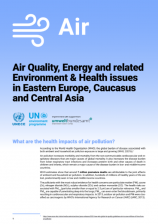Introduction

Good air quality is vital for human well-being. Unfortunately, half of the world’s population doesn’t have access to clean fuels and technologies for cooking and heating, leading to deteriorated air quality. Air pollution jeopardizes seriously human health, and it is associated with health effects such as stroke, heart disease, lung cancer and chronic respiratory diseases, which causes 7 million premature deaths per year in the world and 550,000 premature deaths in the European region. The primary pollutants causing health effects are particulate matter with the latter – especially particulate matter below 2.5 microns (PM2.5) nitrogen dioxide (NO2), ozone and polycyclic aromatic hydrocarbons. Therefore, it is crucial to monitor and assess air quality and health-related impacts, to follow its trends, identify existing gaps and obstacles, and identifying efficient measures to improve air quality and reduce health impacts.
A well-establish Shared Environmental Information System (SEIS) that contains harmonized high-quality environmental and health-related data and indicators could be an effective tool in transparent decision-making to mitigate the health effects of air pollution and environmental degradation caused by climate change. Furthermore, comprehensive and transparent disaggregated information and good cooperation of the environmental and statistical national authorities could help decision-makers inform the right policy for sound environmental management and monitor progress towards the 2030 Agenda for Sustainable development.
With the support of its partners, the UNECE is actively engaged in implementing the Sustainable Development Goals through its multiple activities. For example, the capacity-building webinars are part of the UNECE activities under the UNDA-funded project.
Given the burden of air pollution, the countries of South-Eastern Europe, Central Asia, and the Caucasus experience, the first capacity building webinar in the framework of the UNDA was dedicated to health-relevant air quality data, which took place on 16 December 2020. The meeting reviewed the European perspective and the state on air quality. During the webinar, the Umweltbundesamt - Environment Agency Austria (EAA) focused on monitoring and reporting national air quality data for European Assessments and WHO European Centre on Environment and Health spoke about air quality data for policy-relevant health assessments. Austria, Armenia, Bosnia and Herzegovina, Georgia, North Macedonia, Kazakhstan, Kyrgyzstan and Tajikistan shared their experiences concerning air quality monitoring and data management, national and international reporting, approach to public air quality information (including the availability of not aggregated data) and data use for environment and health policies.
Health-relevant air quality data informing policy and public – SDG 3 and 11
Thematic Overview

- Air Quality Monitoring and Data Management
-
Introduction
Air Quality Monitoring is an important element in understanding and managing air pollution. When monitoring and collecting information on air pollutants, a country should have a well-developed and functional data management system to process and further make use of this information.
Identified Challenges
Deploying high-quality air quality monitoring and data management systems require considerable efforts at national and international levels. During the webinar, the following challenges have been identified:
Armenia Need for modernization of existing air quality monitoring systems in accordance with the international requirements.
Introduce air pollution modeling and forecasting system, linkage to the satellite data.
Accreditation of Laboratories.
Connect local data to the global networks, portals.Armenia Bosnia and Herzegovina Most stations monitor PM10 and not PM2.5.
Intermittent operation of monitoring stations due to budgetary and administrative shortcomings.
Lack of time series data to facilitate trends analysis.
Need to harmonize procedures, QA/QC among different operators.
Absence of reference laboratory.
Need to strengthen AQM instruments.
Strengthen Inspection and Enforcement.
Diversify instruments for AQM.
Strengthen and harmonize legal frameworks on air quality monitoring.Bosnia and Herzegovina Georgia Purchasing/installation of gravimetric equipment.
Increasing monitoring parameters.
Introduction of ambient air quality modelling system for cities.
Expansion of ambient air quality monitoring network according to the provisions of the Air Quality Monitoring Network Development Plan (Roadmap).
Development of ambient air quality management plans and short-term action plans.Georgia Kazakhstan Introduction of air quality standards and methodologies for air quality monitoring Kazakhstan North Macedonia Deployment of better equipment and air quality monitoring instruments.
Systematic monitoring and measurement of PM2.5, VOC, PAHs and HMs
Accreditation of the calibration laboratory.For more information, please see the presentations on the right.
Good practices
For more information, please see the presentations on the right.Georgia Project "Enhancing Air Quality Management Capacities in Georgia" (SIDA and UNDP funded project)
In the framework of the project Georgia has elaborated the Guidance for Maintenance of the Ambient Air Quality Monitoring Network. Besides, 21 international and EU standards air quality monitoring related were adapted. Monitoring data verification and validation procedure was prepared. Georgia elaborated the Guidelines and Methodology for the analysis of one of the main ambient air pollutants - Benzo(a)pyrene. Finally, the capacity development activities/trainings for the Department Environmental Pollution Monitoring were conducted.
Georgia EEA Cooperation with Western Balkan countries.
EEA Eionet network includes the six cooperating countries. EEA has signed the Memorandum of Understanding with each country. The EEA 2-year project kicked off in February 2020 with a budget of 1.3 million euros. The project has focused on the following seven key areas: air quality, water, biodiversity, waste, environmental information systems, Copernicus programme and Knowledge to action.
EEA Bosnia and Herzegovina Improving Monitoring and Evaluation Capacity
Improving air quality and air management project is funded by the Swedish Government and is implemented by the Swedish Environmental Protection Agency (SEPA). The program is a partnership between various institutions, authorities and ministries of Bosnia and Herzegovina, and aims to strengthen the capacity of relevant institutions to better manage air quality data and to improve air quality throughout the country. The project activities will equip individuals, companies, policy makers and the international community with the tools they need to make change and improve air quality in Bosnia and Herzegovina. There are activities on establishing and designating two reference laboratories in both entities of Bosnia and Herzegovina. Besides, quality assurance / quality control manual for performing air quality monitoring is in final phase of preparation.
Bosnia and Herzegovina - National/international reporting (including for SDG indicators)
-
Short Introduction (not from the presentations)
Air quality has a major influence on human health, therefore it is highly important to implement air quality standards based on international experience. National or international reporting of air quality is one of the primary tools to assess the situation in terms of air pollution exposure and to identify gaps that should be addressed in the future.
Identified Challenges
The main challenges that have been reported by the countries in terms of the national or international reporting are the following:
For more information, please see the presentations on the right.Armenia Develop or adapt cross-sectoral assessment tools. Armenia Bosnia and Herzegovina Need for development of national emissions inventory.
Strengthening of Pollutant Release and Transfer Register (PRTR).
Lack of data verification mechanisms and incompleteness of data and time series.
Bosnia and Herzegovina Georgia Establishment data validation system. Georgia Kazakhstan Emissions inventories and source-apportionment studies need to be conducted. Kazakhstan North Macedonia Improve the air quality e-reporting. North Macedonia. Good practices
For more information, please see the presentations on the right.Georgia Project "Enhancing Air Quality Management Capacities in Georgia" (SIDA and UNDP funded project)
With the help of SIDA and UNDP funded project, Georgia was managed to assess the data between 1990 and 2007. Time period required by international obligations was fully covered. Data consistency and data transparency were improved. The methodology for inventory was upgraded (fully in line with EMEP/EEA Guidebook 2019). Finally, in total emission inventory is implemented for 50 subcategories.
Georgia EEA ENI SEIS II project
Within the project there have been prepared the fact sheets for Armenia on the status of air quality monitoring. Two regional capacity building events (Copenhagen and Tbilisi) with country visits have been carried out to gauge the current situation with legislation, institutional set-up and existing infrastructure (automatic stations, air quality information systems, databases, IT infrastructures, etc.) and deliver hands-on training on the open source e- reporting tool RAVEN developed by the EEA and its experts.
EEA - Approach to Public Air Quality Information (including the availability of disaggregated data)
-
Introduction
The public access to air quality data and public participation in air quality management is crucial. It allows population, including the vulnerable one, to follow and understand the health impacts of air pollution. In addition, improved access to air quality data is one of the instruments of influence on the air quality management process at local, national, and international levels.
Identified Challenges
For more information, please see the presentations on the right.Armenia Absence of a real-time data for the public for better understanding of air pollution. Armenia Bosnia and Herzegovina Pollutant Release and Transfer Register (PRTR) is not always publicly accessible. Bosnia and Herzegovina Kazakhstan Population is not informed during severe pollution levels. Kazakhstan North Macedonia Raising public awareness. North Macedonia Good practices
For more information, please see the presentations on the right.Austria Styrian Clean Air (II) project
The goal of the project is to raise public awareness on how the user can influence emissions from biomass domestic heating. Besides, it is meant to illustrate significant emission reduction by “correct heating” and to illustrate influence of conditions.
Austria EEA SEIS II East Project (2016-2020)
The target countries of the project are Armenia, Azerbaijan, Belarus, Georgia, Moldova, Ukraine. The project aimed at increasing the use and public accessibility of air quality data in the six Eastern Partnership countries. In the framework of the project, there were two regional capacity building events, follow up country visits, hands-on training on e-reporting. The outputs of the project were: country fact sheets on air quality monitoring and reporting, graphic user interface for RAVEN+ application and inclusion of real time data in the European Air Quality Index for Georgia and Ukraine.
EEA - Data Use for Environment and Health Policies
-
Introduction
Environmental and health data are closely entwined, they serve to produce environment and health-related assessments. They help to understand the priorities and necessary actions to be taken by the interested stakeholders at local, national, regional, or global levels to mitigate the environmental and health impacts of the climate change, for instance.
Identified Challenges
For more information, please see the presentations on the right.Bosnia and Herzegovina Better understanding of the health impacts on its populations.
Strengthening health statistics.
Harmonization of the reporting with international systems of disease classification.
Bosnia and Herzegovina Good practices
For more information, please see the presentations on the right.Bosnia and Herzegovina World Bank Air Pollution Management Project
Between 2018 – 2019, the World Bank conducted analytical work on air pollution in three Western Balkan countries: North Macedonia, Kosovo, and Bosnia and Herzegovina. The studies covered – inter alia – analyses of source apportionment, health analytics, economic assessment of the welfare costs of air pollution (Cost of Environmental Degradation), and simulations of impacts of selected policy reforms. The motivation behind the project was to provide a better understanding of the sources, health impacts, and welfare costs of air pollution as well as possible policy reform options
- World Health Organisation AirQ+ tool
WHO AirQ+ tool is a software, which can be used to quantify the health effects of air pollution. This information can support decision-makers to develop appropriate actions to protect public health. It available in English (2016), Russian (May 2018), French (Oct 2018), German (upcoming). The tool is mainly used by environment (50%) and health sector (42%) research (62%) and policy interventions (29%) national (24%), regional (25%) and local (49%).
World Health Organisation - Questions and Answers
-
Question: In Kazakhstan there is a request from public to use WHO guidelines for assessing air quality, whereas another part of the public suggests using the US air quality standards. What the best approach according to the EU opinion, EAA, other organizations?
Answer: The logic of the European air quality legislation is to find first where there are countries’ problematic areas of air pollution. They are the exploratory measures, which will lead to the definition of zones. For instance, one country should follow the steps of another country, which is more advanced in this area.